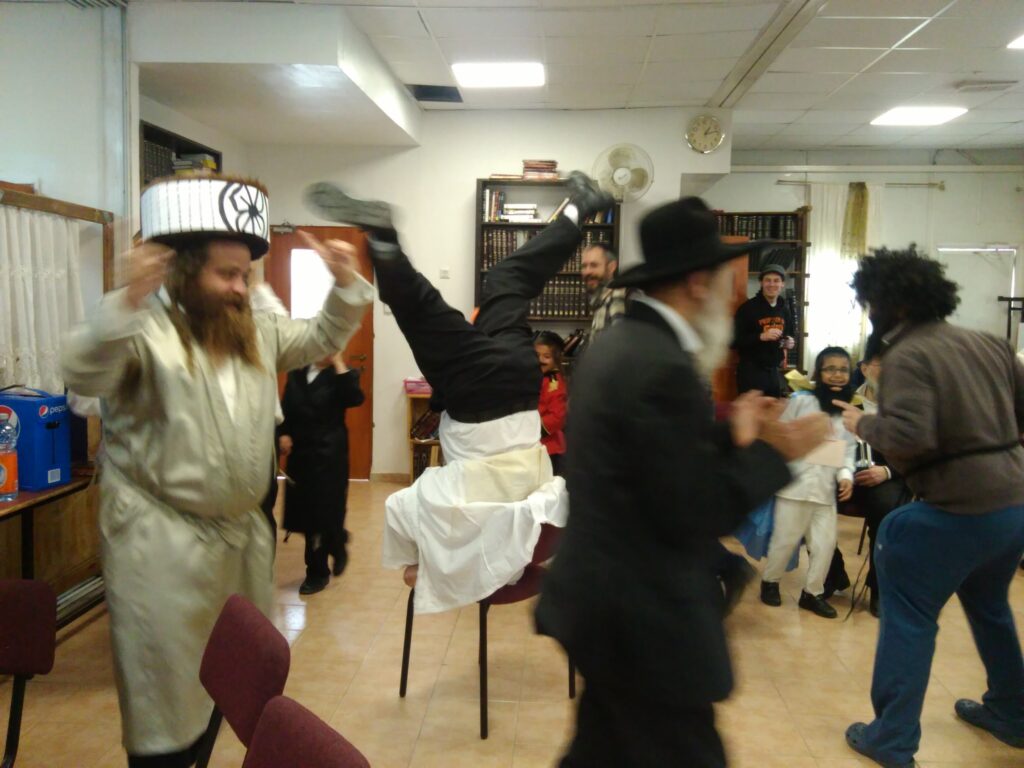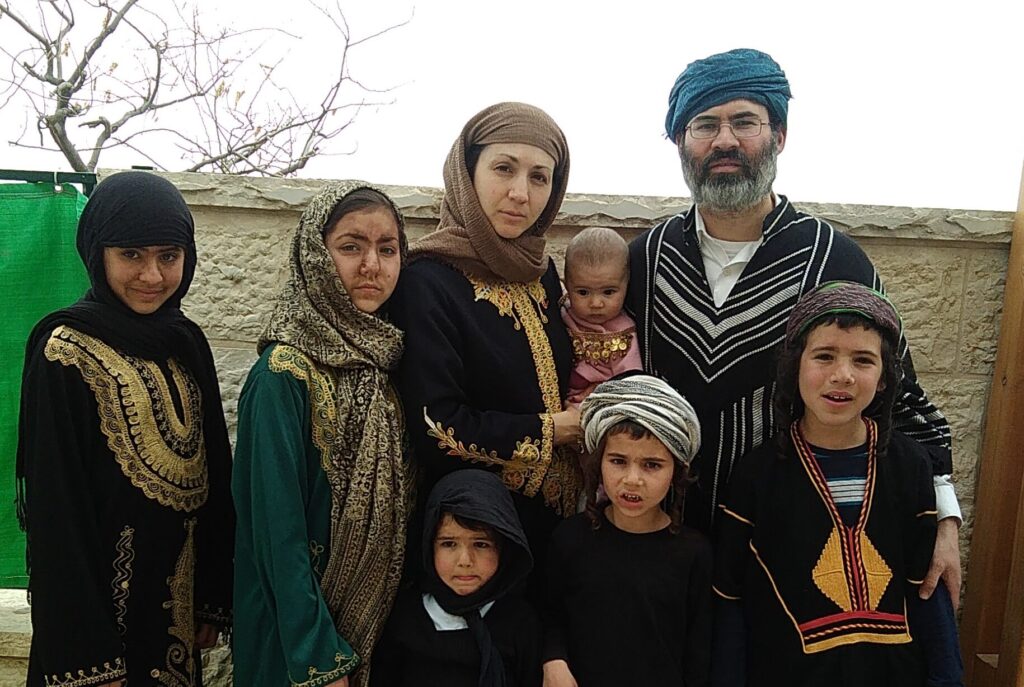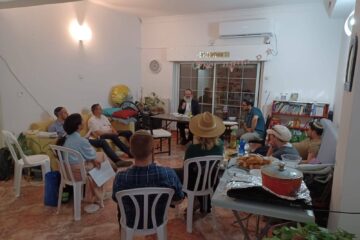Should a religious Jew get drunk on Purim? Rabbi Miller explores this controversy.
The behavior in the first chapter of Megillat Esther is repulsive. A hundred and eighty day long drinking party, concluded by a seven day wine-fest finale, the flaunting of wealth and honor, license for reckless behavior כרצון איש ואיש and Queen Vashti being forced to appear “immodestly” in front of the King and his guests are a few of the explicit examples of the nauseating activity and conduct that was playing out in Shushan.

Gemara Megillah 12a
“In addition, Queen Vashti gave a banquet for women, in the royal palace of King Achashverosh.’ (Esther 1:9) Rava said: Both of them Achashverosh and Vashti had immorality in mind.” (Gemara Megillah 12a)
Chaza”l elaborate further and add much more to the denigrated picture. Persia’s world power status and whether Jews were there or not put aside, these parties were sickening and reflect how low humanity can fall.
Mishteh, a wine feast
After we internalize the above, it should be shocking to us that the way we celebrate our salvation is through parties and a Mishteh, a wine feast. If given the choice to create the nature of the holiday of Purim, many would react to the despicable drinking, partying and sensuality by demonstrating the “Jewish way” of elevated living. We might spend the holiday in somber prayer or deep study, reflecting Yirat Shamayim. We might designate the day for calm, quality time with family and loved ones, showing our commitment and “family values” as a response to the reckless and ill-committed.
Shulchan Aruch on Purim
How is it conceivable that the Jews reacted to their victory by having a Mishteh – drinking party, then Mordechai decrees that these days be days of drinking festivals and joy “for year after year?” Furthermore, the Gemara on Megillah 7b tells us the obligation on Purim is to become drunk until you don’t know the difference between Haman and Mordechai and the Shulchan Aruch quotes this to be the halacha? Where is “the Jewish reaction?

Why does it seem that not only did we not react to the disgusting behavior in Shushan by doing the opposite, we add insult to injury by coding a halacha, according to a majority of Rishonim (Ri”f, Ramba”m and others), that getting drunk at a Purim Seuda is obligatory? Meaning, King Achashverosh only attained the place of “כטוב לב המלך ביין” “When the heart of the king was merry with wine.” For us Jews, that’s not good enough, we have to literally get drunk at our Mishteh until we completely lose touch with reality!
While it is true that some great Rabbis throughout the ages downplay or eliminate drinking on Purim (and one can certainly do as they instruct, in practice), the tone in the Megillah and the opinion of the majority, as expressed in the Gemara and the Shulchan Aruch, must be reconciled or explained? Perhaps the Rabbis, with their Divine spirit, had Purim 5781 in mind. After such a difficult year dealing with the Coronavirus and its various challenges, the Rabbis had the foresight to understand that the survivors would either be in need or are deserving of a few drinks!?

some responses:
Prof. Michael Miller, Jerusalem
I think the Rabbis offer us a challenge. We can have a party, a wonderful Suda, do lots of drinking and come close to total inebriation as long as we retain Kedusha towards others, family friends, women and above all Hashem. If we cross that line and lose Kedusha and fall into inappropriate behavior we are not any better than our enemies. That is the challenge our Rabbis throw at us.This once a year challenge is mirrored by the rest of the year when we do not drink to excess but still have the challenge without the alcohol of leading our lives with Kedusha in the ways of our Creator. This includes speech, dress, appropriate action toward others, acting kindly and being in all ways role models of kind, sensitive people. I believe many of us fail with or without the alcohol and that is what the Rabbis want us to understand and to work toward changing.
Avi Hoffman, Old City of Jerusalem
This is my understanding of the topic:The Gemara says as follows:אמר רבא: מיחייב איניש לבסומי בפוריא עד דלא ידע בין ארור המן לברוך מרדכיEveryone knows that line; it’s probably the best followed Halachah in Judaism. What everyone forgets, though, is the story that follows; how Rabbah and R’ Zeira were having a Seudas Purim together, had some wine, and Rabbah slit R’ Zeira’s throat, nearly killing him.That, and nobody looks at the first Tosfos on that Daf, which completes the phrase (as found in its full form in Yerushalmi):עד דלא ידע בין ארור המן לברוך מרדכי ארורה זרש ברוכה אסתר ארורים כל הרשעים ברוכים כל היהודיםIf that’s the actual phrase, it makes a lot more sense. In a way it’s like the “walk in a straight line” test. After a few drinks, most people won’t be able to walk in a straight line, just like most people probably won’t be able to say that phrase properly. Many of us can’t say that phrase BEFORE we start drinking, and therefore are ALREADY at the place of “Ad DeLo Yada”, even before taking a sip of wine! Now, the Rosh says that one should drink a little bit more than he’s used to and fall asleep, and some Mephorshim say that one need only forget how to do the math of the Gematria of ארור המן and ברוך מרדכי. Others seem to say that one should actually drink himself to the place of “Ad DeLo Yada”, and the Rambam even goes as far as to say that if someone damages someone else’s property while under the influence on Purim, he need not reimburse him.That Rambam is the most extreme position I’m aware of, but I understand it as follows:Nobody says you have to get plastered, and nobody says we should drink “כרצון איש ואיש”, or even “כטוב לב”. It’s all until one doesn’t KNOW the line; ארור המן לברוך מרדכי ארורה זרש ברוכה אסתר ארורים כל הרשעים ברוכים כל היהודים. It’s a very concrete point, and not subjective in any way. It seems to be a much more “controlled” inebriation than that of Achashveirosh’s 180+7 day party.Every person is different. Some people will need two cups to forget the line, some people will need a bottle, some don’t even know it before they start drinking. It seems to me that those who are more aware, and did more work to prepare themselves mentally and spiritually for Purim will take longer to forget the line. It’s specifically THOSE people; who are spiritually prepared for Purim, who SHOULD drink more. If someone doesn’t care about Purim and just wants to get drunk, he won’t know the line to begin with, and therefore SHOULDN’T EVEN BEGIN DRINKING.I end with one final point:The Siman in Shulchan Aruch that brings down this Gemara is Orach Chaim 695. Every Jew should be as Machmir about Siman 695 as he is with the 694 which precede it.Have a great Shabbas and a freilichin’ Purim!!



0 Comments